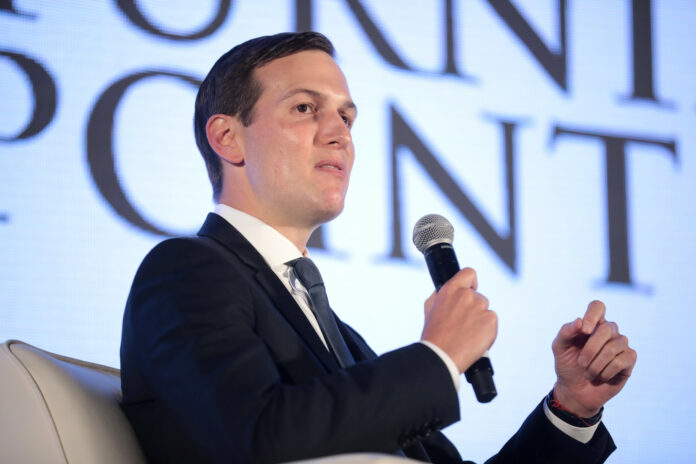A political failure or an artistic triumph?
If you’re a sane human being, an increasingly rare combination of traits, you likely remain hopeful that we can still achieve a peaceful two-state solution to the Israel-Palestine Conflict — a solution that shows great respect to Palestinians and Israelis alike, while also forcing both sides to make concessions. Arriving at this ideal outcome requires an elegant and artful approach to diplomacy.
This is why art patrons worldwide were positively thrilled when President Donald Trump delegated the Melania-old — excuse me — millenia-old challenge of bringing peace to the Middle East once and for all to his baby-faced son-in-law, Jared Kushner. Kushner is an up-and-coming real estate artist known for his avant-garde work in the slumlord sub-genre. Despite being new to the art of diplomacy, Kushner has demonstrated great humility.
“‘Every artist was once an amateur,’ said Ralph Waldo Emerson,” said Kushner. “I learned that quote after my dad bought me that ticket to Harvard.”
To prepare for this diplomacy-real estate fusion project, Kushner quickly read 25 books on the Israel-Palestine conflict to bring himself up to speed with the professionals. Yet he remains confident that his youth has given him a leg-up on the career diplomats whose tastes tend to be more traditional and perhaps less tolerant of the fresh creative spirit of younger people, especially those in real estate.
“‘Every child is an artist — the problem is how to remain an artist once we grow up,’ said Picasso,” said Kushner.
It took three years, but the Kushner peace deal has finally been released, and the silky soft contours of Kushner’s cushy face prove that he has not grown up. What does that mean for the quality of the piece itself? Well, it’s clear that Kushner went about drawing his new map of the Middle East with great skill, technical mastery and command of his craft, painting a clear picture of how he envisions the future borders of the Israeli and Palestinian states.
“‘A picture is a poem without words,’ said Horace,” said Kushner. “Alternatively, ‘You don’t take a photograph, you make it,’ said Ansel Adams.”
Kushner’s magnum opus, however, has fiercely divided the critics, with many suggesting that he lacked inspiration and purity of artistic intent. The deal was labeled provocative and unfair, with The New York Times writing that the plan “strongly favors Israeli priorities rather than having both sides make significant concessions.”
“‘Painting is easy when you don’t know how but very difficult when you do,’ said Degas,” said Kushner. Kushner later noted that it would be unwise to make concessions, given that snack-food wrappers are noisy and would clutter the table, distracting from the peace-making process.
The plan has sparked protests in Gaza and the West Bank, and Palestinian Authority President Mahmoud Abbas has already rejected it. This has not dispirited Kushner.
“‘Creativity takes courage,’ said Henri Matisse,” said Kushner.
The widespread anger over the plan is likely related to Kushner’s bold creative decision to entirely exclude Palestinian input. Nevertheless, President Trump and Israeli Prime Minister Benjamin Netanyahu are pleased that the uproar over this daring aesthetic choice has distracted their fans from their respective impeachment and corruption trials. Netanyahu referred to the plan as the “deal of the century,” despite the international community’s strong criticism of its flaws.
“We don’t make mistakes, just happy little accidents,’ said Bob Ross,” said Kushner. “We didn’t actually want to make a deal that pleases everyone — we wanted to challenge people intellectually and expand their ideas of what’s possible with the “peace deal” medium. Plus, what great works of art haven’t been controversial? Think of Igor Stravinsky’s ballet, ‘The Rite of Spring.’ It’s a mark of success that our work has infuriated people in the same way as one of the greatest works of modern art of the 20th century.”
At the 1913 Paris premiere of ‘The Rite,’ the audience rioted in response to the violent, subversive, modernist music and choreography.
“‘Lesser artists borrow, great artists steal,’ said Stravinsky,” said Kushner.
Given the significant portions of land in the West Bank that Israel would be allowed to “annex” under the plan, it’s obvious that Kushner truly aspires to be considered a great artist.
Written by: Benjamin Porter— bbporter@ucdavis.edu









